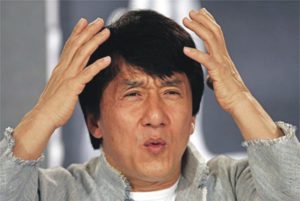A few months ago I watched the Chinese New Year episode of Fresh Off the Boat. In the episode the Huang family was looking for a new year celebration to since they couldn’t make it back to DC to celebrate with the rest of the family. They found one organized by the Orlando Chinese American Society. Unfortunately the society was comprised of non-Asians who didn’t have a clue as to what Chinese New Year was about or how it was celebrated.
Yeah…that is not a traditional dragon dance.
However, that is the traditional reaction to well-meaning displays of “Asian culture”.
I’m not trying to shame the organizers of such events, or authors of Asian flavored stories. Five points to their house for trying. But they’re not going to win their house the cup because they made a big mistake. They mistook the stereotype(s) for the truth.
There’s one thing that a lot of non-Asians don’t understand: most Asians are not Fu Manchu, Kung Fu master, dragon lady, tiger moms. We don’t talk like Christmas Eve or Charlie Chan, and we definitely are NOT Long Duk Dong. Geisha are not prostitutes, and just because we’re not white doesn’t mean that we were born in the land of our ethnicity — and just because we were born elsewhere doesn’t mean it was so we could claim citizenship.
Yes, that may come across a little harsh but it’s hard to be calm and collected when it’s 2016 and people still think that 200 year old misconceptions are the truth. When I played Christmas Eve in Avenue Q I was given the direction to play that character (which was already a soul-killing stereotype) as a tiger mom because “I knew what that was.” They implied that I knew because my mom was a tiger mom; because all Asian moms are tiger moms. Well guess what? I don’t know what that’s like. My mom is not a tiger mom. Heck, my entire family is sans tigris. Even when my mom wears tiger print she is not a tiger mom.
I didn’t get mad at the director for that because they weren’t trying to offend me — believe me, I’ve experienced that enough to recognize it. They simply didn’t care enough to learn if what they thought Asians were like was the truth or a stereotype. And that’s the biggest secret about writing about any ethnicity that isn’t your own. You have to care enough to do the research.
So how do you get it right? First, you can’t assume that we’re all the same. There are 48 countries and over 2,000 languages in Asia. Some of those countries, like China, have so many regional identities and dialects that there isn’t one standard Chinese identity. Then there are mixed race individuals, like myself, whose cultural identity is a blend of their country of birth and their country of heritage. Skin tones can also vary with the region. So if you’re writing an Asian character, I recommend that you not only pick a country for them to hail from but also pick a specific region or city. Keep in mind that the more remote the place the harder it will be to do the next step.
Research. The best research for this is to interview someone of that ethnicity, from that region. We’re not hard to find. Call or email Asian associations or community centers. If you’re feeling particularly brave you could go to an Asian market or a restaurant that serves the cuisine of the country you chose and ask the staff if there’s anyone from ______ place that you could interview for your book. I do recommend that if you’re at a restaurant that you eat a meal there. Not only is it polite but you might be able to interview a staff member while you dine.
If you are able to interview them on the spot make sure you get their contact info so you can ask them any questions that might pop up later AND so you can have them read the manuscript to make sure you were accurate. This part is key because there’s not only a difference in custom but of mindset. An action that seems perfectly reasonable here might be horrifying to that culture and vice versa.
You can also read autobiographies of people of that ethnicity, from that region. Biographies, histories, and websites work too but make sure they’re from a reputable source. If it was written by a non-native and they’re citing non-native sources, don’t trust it.
It’s our responsibility, I’d even go as far as to say it’s our moral obligation as writers to create characters that are authentic because readers assume that we know what we’re writing about. If we don’t care enough to get it right then we offend readers of that ethnicity — thus losing them as readers — AND we mislead and misinform the readers who aren’t familiar with that ethnicity. Also, by misrepresenting that group we’re ultimately contributing to the cultural oppression of that group — even though we don’t mean to.
You can find out more about Kim May here.



I saw that episode too. It made me smile. When people ask me about my Chinese son-in-law (from Jiangsu Province), I’ve learned to say, “He doesn’t look a thing like Hop Sing.” They look surprised and laugh. So do I. Then, I tell them he is more than six feet tall, is a civil engineer, and really likes ice cream. More smiles. I also make a point of introducing him when they are here and most of my friends are charmed by his use of English and his very courteous interest in them. I think, after people get past the stereo-types, they can act and react as human beings. Something all of us are. As you point out, we just need to take the time and make the effort to learn about each other. I certainly agree that time and effort to make our stories (and lives) authenic makes a difference to our readers as well as the people around us. Thank you, Kim, for the reminder.
You’re welcome! Thank you for sharing your experiences. That’s a pretty clever come back!